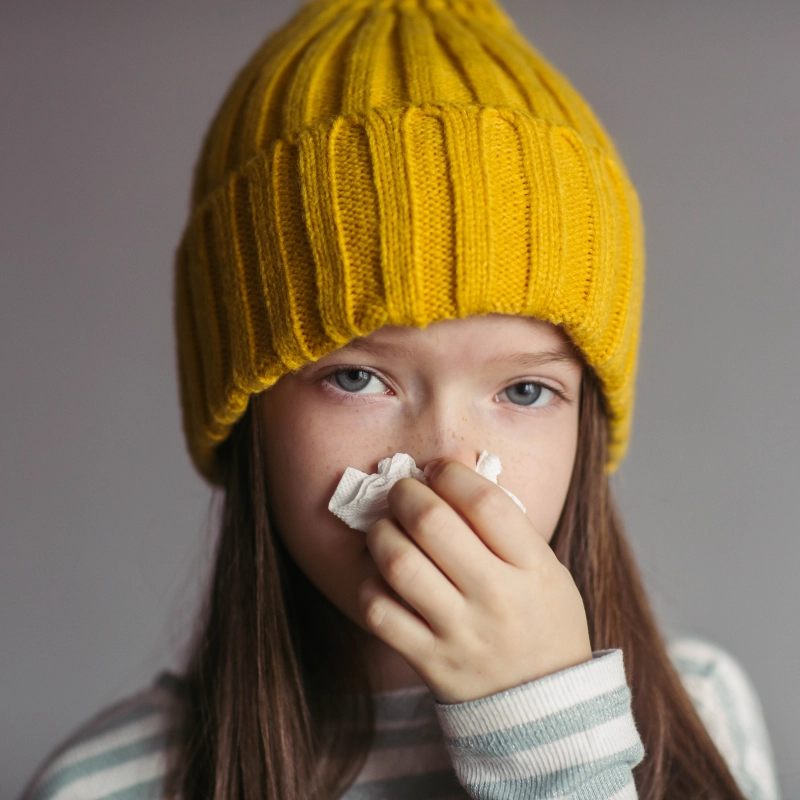
Winter weather is conducive to viral infections
A dip in the temperature enables several viruses to thrive and new viruses to get into circulation. Most of these viruses are respiratory viruses – for example, rhinovirus, RSV, and influenza (Flu) virus which can cause cough, cold, fever due to cold weather, and gastrointestinal symptoms in children, such as nausea, vomiting, and diarrhea. Some of the winter viruses responsible for these conditions include Norovirus, rotavirus, adenovirus, and the like. All of these viruses are highly infectious and spread easily from person to person. They change (mutate) and overcome immunity gained by previous exposure to varying extents. Hence in winter, it is not unusual for kids to come down with these viral infections.
Respiratory viruses: What are the symptoms?
These are most common and children often present with some or all of the following –
- Runny nose, itchy eyes
- Fever
- Cough
- Headaches and body pain
- Poor appetite and lethargy
There may be a gradual onset with cold symptoms for a few days prior to fever or an abrupt onset of high fevers. Often we see there are other members of the household unwell with milder symptoms and similarly unwell friends and schoolmates.
Gastrointestinal Viruses: What are the symptoms?
These are common with an abrupt onset of vomiting, often with fevers and then in some instances they develop frequent loose and watery stools. Children often lose appetite and because of nausea are unable to keep down food and fluids and become dehydrated.
What are the signs of dehydration?
Dehydration happens when the fluid loss due to fevers, vomiting or diarrhoea exceeds what the child is offered or is able to consume. Following are the signs that your child may be getting dehydrated:
- Sunken eyes
- Sunken soft spot on the head in an infant
- Lethargy/weakness
- Passing urine less frequently
- Mouth appears dry
- Not much tears when child is crying
- The skin on the tummy feels flabby and has lost turgor
Can children with minor illnesses be managed at home by parents?
As these episodes are frequent, parents should know how to manage them.
- For fever and cold with mild cough – enquire about what medicines and at what doses they can be given to your child when you have a consultation with your paediatrician.
Commonly used medications are:
- Paracetamol for fever
- Antihistamines like Cetirizine or Fexofenadine for cold and cough
- Saline nasal drops and medicated nasal sprays for blocked nose
- Ondansetron or similar medication for nausea and vomiting
- Keeping the fever down with medications and keeping the child comfortable in light clothing helps
How to keep the child well-hydrated?
Be it fever or when the child has vomiting and diarrhoea, it is important to keep the child well hydrated. Keep offering small amounts of fluids like ORS, water, coconut water and juices often. Work with the child’s preference. In a breastfeeding infant, breastfeed often. If giving vomiting medications, allow half an hour for the medicines to work before you offer food and drink.
Do not force feed but keep offering soft and easily digestible food that is to the child’s liking and age appropriate. Do not unduly restrict foods for the fear of illness getting worse.
What are the Danger signs and when to bring the child to hospital?
Parents need to be aware of the following and seek emergency medical attention in the event of any of these concerns:
- Poor activity, drowsy and difficulty in waking up
- Any infant less than 3 months of age with fever and other symptoms
- High fevers, which do not easily respond to medications
- Repeated vomiting or loose stools and the child is unable to keep down liquids
- Fast breathing, chest in drawing, difficulty in breathing
- Sudden change in behaviour for e.g., inconsolable crying and irritability
- Rapidly spreading rash
- Abnormal movements like jerks, stiffening of limbs, up rolling of eyes (can be fits)
- Bluish discolouration of lips and tongue (cyanosis – suggests oxygen levels in the body are low)
- Additionally, if the fever or the illness is going on for more than 2 days child needs to be assessed
While winter is a time that your child may fall sick more easily or repeatedly, it is important to stay calm, start simple medications at home, keep the child well hydrated, and consult your doctor when you observe any danger signs or if the illness is prolonged.
Author: Dr Rajath Athreya
Dr Rajath Athreya is a senior consultant and HOD of Pediatrics and neonatology at Sakra World Hospital. He has over two decades of experience in this field. He has worked for over a decade in the UK. He is one of the best pediatricians in Bangalore heads the pediatric and neonatal services at Sakra World Hospital which provides a complete range of medical services to children and their families.

